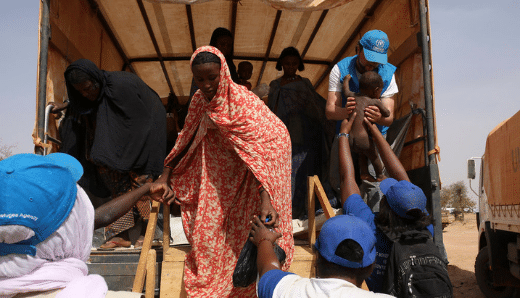On 23 January, a coup takes place in Burkina Faso by the military group Patriotic Movement for Safeguarding and Restoration (PMSR). The democratically elected president Roch Kabore is deposed; he is no longer considered capable of addressing the worsening security situation. The leader of the PMSR, Paul Henri-Sandaogo Damiba, appears on TV to announce that they will take over the country's administration from here.
In the national square of the capital Ouagadougou, citizens gather to express their support for PMSR. Some of them burn French flags. In doing so, they show dissatisfaction with the former coloniser; France has failed to ensure security and stability in the region. This is already the fourth coup in Central/West Africa in a year.
Hope and stability lost
For some time, Burkina Faso was considered a stable factor in the Sahel and the country that still offered some hope for the region. In 2014, the most democratic elections on the African continent in ages took place here. The future seemed bright and optimism ran rampant among the population.
Nothing seems to be left of this today. The Sahel is increasingly plagued by violence. In 2012, an uprising by marginalised Tuaregs began in neighbouring Mali. Within a few years, this grew into IS- and al-Qaeda-linked armed groups, the most prominent of which is Jama'at Nusrat al-Islam wal-Muslimin (JNIM). This is now the fastest-growing armed movement in the world.
In 2016, they also enter neighbouring Burkina Faso. Northern parts fell into terrorist hands, and areas spread across the country soon followed. Crucial thoroughfares, police stations and military bases were taken over, and schools were also frequently targeted in violent attacks. Pupils and teachers were not spared in these.
With more and more territory held by terrorists, fewer areas remain for local communities. This creates new competition and also reignites old conflicts between these communities. An entire country in chaos is now the result.
'Fastest growing humanitarian crisis'
On 16 February, PMSR leader Damiba was inaugurated as president of Burkina Faso. The former president is still under house arrest in Ouagadougou. Damiba will be head of state during the PMSR-appointed 'transition period'. The military authority promises to restore constitutional order and that democracy will return in the foreseeable future. However, a date for new elections has not been given.
Since the coup, the current leadership seems to be focusing mainly on fighting the armed groups, losing sight of the emerging humanitarian crisis. Meanwhile, thousands of people have been killed by the violence, 1.7 million have fled and it is estimated that at least 3 million will face food insecurity. Called the world's fastest-growing humanitarian crisis by the United Nations, it is the fastest growing crisis in the world.
Countless people have now become dependent on the work of volunteers and NGOs. But the deteriorating situation in the country has made it increasingly difficult and dangerous for them to continue their work. Added to this, many such organisations have reduced their funding for operations in Burkina Faso by 70%, in favour of operations in Ukraine. "We are very concerned that this will become a trend, making access to healthcare and other basic services even scarcer for displaced people in Burkina Faso," says Safia Torche, general director of Médecins du Monde in Burkina Faso.
Opposition in reactions
For some time, many citizens in Burkina Faso had lost confidence in former president Kaboré. There was anger over the relentless attacks by jihadist groups and the lack of a response from the government. Among the population, therefore, there was widespread support for the coup. Fahira Rodrigue Kone, senior Sahel researcher for the Institute for Security Studies, warns that the population could be disappointed again in the long run; the resources of this new authority to improve the situation are limited.
International reactions to the coup have been mostly disapproving. For instance, Burkina Faso is no longer welcome at the African Union and the Economic Community of West African States. The EU also condemned the coup. It has threatened sanctions and withdrawal of financial aid if constitutional order is not restored. It also called for the release of the arrested president.
'The situation is already worse'
Whereas EU member France harshly rejected an earlier coup in Mali, the country is now in a more difficult position, says former CIA officer Michael Shurkin. In 2014, France launched Operation Barkhane, an ongoing mission against insurgents and Islamist groups in Africa's Sahel region. Although the current authorities in Burkina Faso have sidelined a democratically elected president, these same authorities are acting against the extremist groups that are violently rampaging through the country. This puts France in a dilemma. Yet they will finally have to choose to cooperate with whoever is in power to continue Operation Barkhane, Shurkin argues. ''If they walk away now it will fall apart completely.''
Researcher Kone's position seems in line with Shurkin's. "A decade of fighting in the Sahel proves that [a] military-oriented strategy that does not include negotiations with armed groups and other counterterrorism options has not worked," he said. He added that a strategy along these lines would not worsen the situation; ''the situation is already worse''. Burkina Faso has now become the epicentre of conflict in the region.
Photo: Flickr





